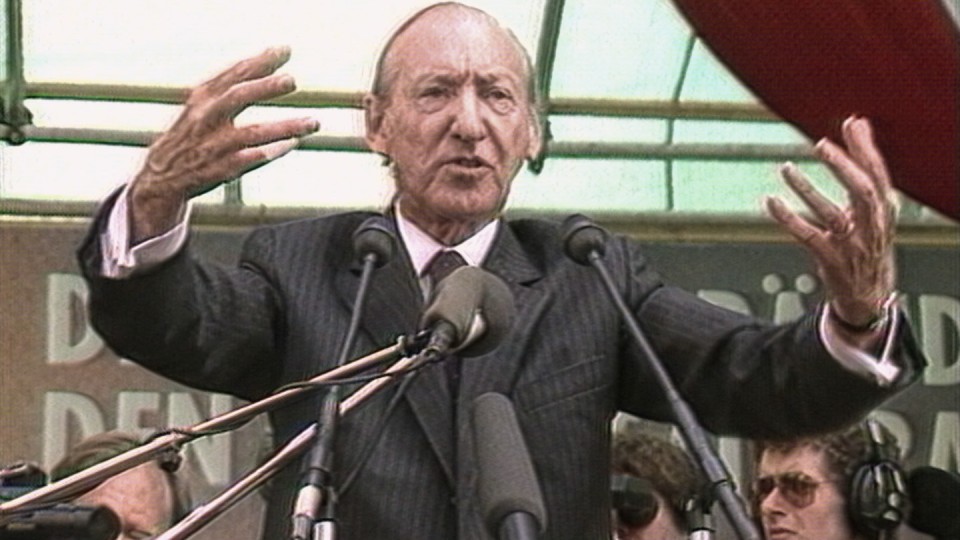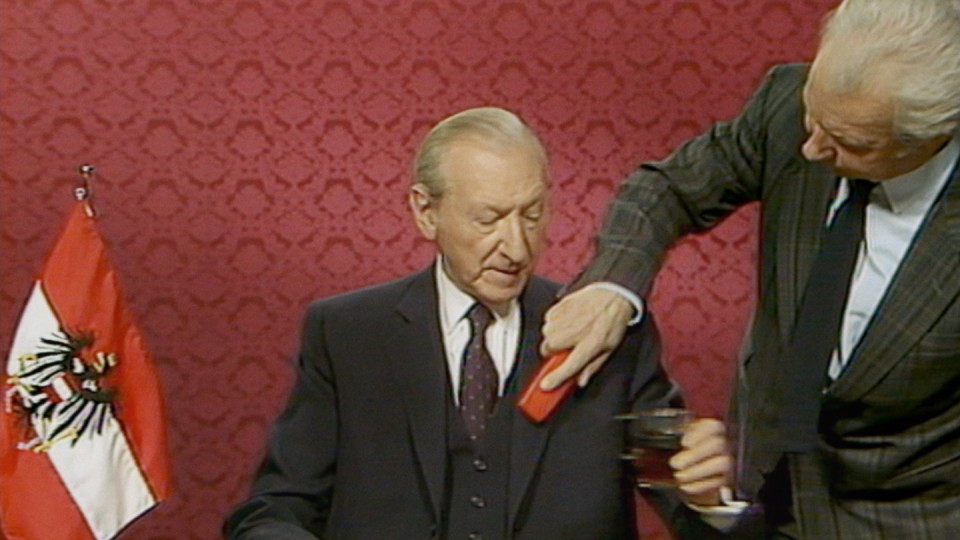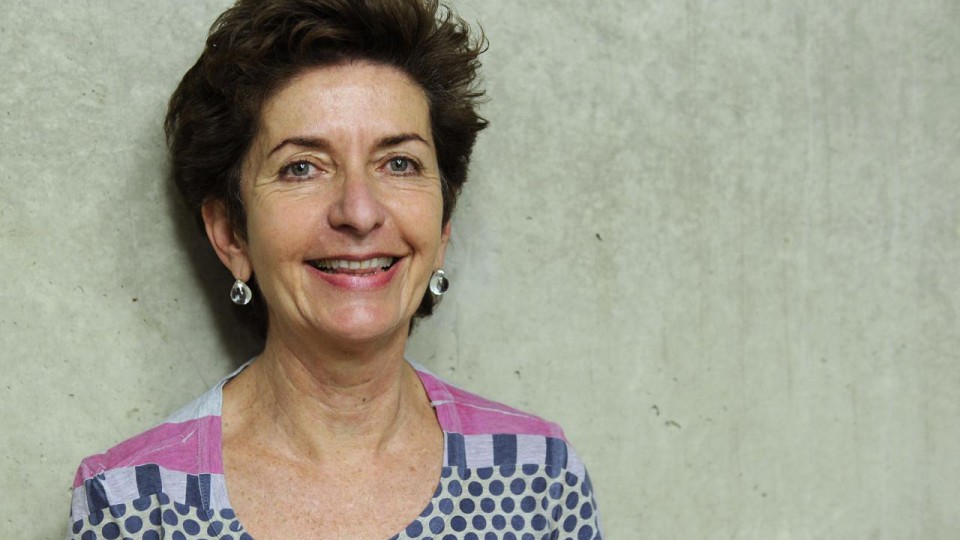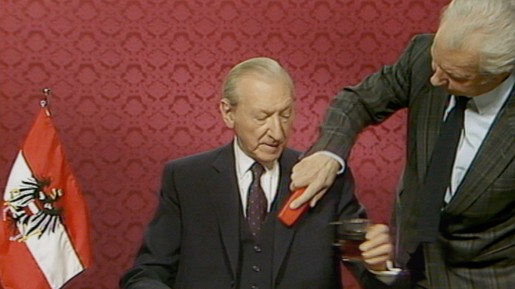Kurt Waldheim’s lapse of memory concerning his Nazi past was the beginning of a process which saw the Austrian narrative
– that the country was the first victim of National Socialism – eventually eroded. His campaign for the 1986 presidential
election polarised the country. Ruth Beckermann, an activist at the time, has now edited Austrian and international archive
material for The Waldheim Waltz to create a film which, from a distance of 30 years, revisits the conflicts in collective and individual memory and traces
the roots of the current situation in this historical context.
In 1986 Kurt Waldheim is elected President of Austria. In 2000 the first Black/Blue coalition (between the conservative Austrian
People’s Party and the right-wing Freedom Party of Austria) rules the country. We meet for this interview two days after
the Kurz/Strache government is sworn in – 17 years after the first Black/Blue coalition. It seems as though Austria's
political landscape goes in cycles, shifting in a right-wing direction about every 15 years. To what extent do you regard
the Waldheim affair as symptomatic of the political landscape in Austria, and is that why you wanted to raise the subject
again?
RUTH BECKERMANN: I actually started research for this film before Die Geträumten (The Dreamed Ones), and then I put the project on hold. I was prompted to return to the subject when I looked at some footage I had shot myself
in 1986, and people who were not even born at the time encouraged me to make a film. No matter how absurd it sounds, the political
landscape of Austria is still dominated by National Socialism. The Waldheim affair and the Hofer/Strache phenomenon are two
sides of the same coin. The scandal surrounding Waldheim was an attempt to come to terms with the past at last, in some halfway
honest manner, and dismantle the victim lie: the claim that Austria merely a victim during the Nazi era. Finally Austrian
involvement in National Socialism was examined from a different perspective. What Hofer and Strache are doing today is actually
the opposite: they are employing elements from Nazi ideology in order to shape the future. And to conceal what they're doing,
they adopt an aura of innocence. That’s the worst thing about the current situation.
The Waldheim Waltz establishes a link to your film East of War from the year 1996, where you observe the reactions of visitors to an exhibition entitled Vernichtungskrieg (War of Extermination) which documented atrocities committed by the Wehrmacht on the Eastern Front. What you observed collectively
10 years after the Waldheim affair you have now placed under the microscope in association with the individual Kurt Waldheim,
as a symbolic figure. Is this your way of approaching one of the crucial questions which dominates your filmmaking: how do
we human beings construct our memories?
RUTH BECKERMANN: I think memories constantly become reconstructed. That applies to our individual memories, depending on the priorities we
impose in the present. And collective, national stories are constantly being modified and rewritten, depending on the requirements
of the present. In that sense it wasn't just interesting for me to see my own material after a period of 30 years; it was
also fascinating to re-examine my own memories and take a look at myself overall, in the international context of the material
that was filmed at the time about the Waldheim affair. Individual memories can also be deceptive.
The sequence where Gerhard Waldheim attempts to defend his father in a hearing and is reduced to silence by the arguments
of the person opposite him is among the strongest moments of the film. Do you regard this moment as symbolic of the division
that emerged in post-war Austria between the war generation and subsequent generations, which permitted a new perspective
on the past for the first time?
RUTH BECKERMANN: Gerhard Waldheim is a son who exposed himself to an incredible extent by defending his father. After all, the division we're
talking about also runs within the generation of the sons; there were people of that generation who were hugely critical of
their fathers, precisely because of the Waldheim affair. The footage of that hearing is absolutely fascinating. It was never
broadcast, but it has been preserved uncut, in the original length; that alone makes it a curiosity, and of course it's the
heart of the film. Due to the dramatic setting of a hearing, both sides are represented in the same room. From my perspective
today I see the Waldheim affair as a conflict of generations which demonstrates how differently sons behave towards fathers.
On the one hand Gerhard Waldheim was quite offensive in his defence of his father, while on the other hand the staff of the
Jewish World Congress are the same generation as him, and they're also sons. In some cases sons of fathers who arrived in
the USA as refugees from Europe, or of families who felt guilty because they didn't do enough to rescue their brothers and
sisters. On both sides there was a process of coming to terms with the Nazi past. In The Waldheim Waltz it's also about teasing out the completely different agenda pursued by the Americans. They were concerned with Waldheim's
career as General Secretary of the United Nations; they wanted to smear the UN as a humanitarian institution and its policies
in the 1970s, while in Austria it was all about the victim lie.
You make reference in the film to nature and also to "laws of nature" like the concept of the family. What role does the idea
of nature play in The Waldheim Waltz?
RUTH BECKERMANN: In the conservative value system that Waldheim advocates, the family is considered natural – but only in the traditional
form of husband, wife and child. People get married and stay together until death. That is a "law of nature". Of course, I
also make reference to the Heimat film (the patriotic "homeland film" with a rural setting and sentimental story) and, in
addition to that, to Austria's tactic – which functioned wonderfully for a while – of conflating its claim of innocence
and its natural beauty. Depicting nature as something innocent is a lie. But this has been done again and again on a sort
of mythological level, in order to distort history and present nature as a pure, original force. Austrian films like Sissi practice this technique: the film was made during the post-war period, and it fabricated an earlier past epoch (of the Austro-Hungarian
Empire) by featuring very young actors, implying that there was nothing between that past and the present of the film –
by skipping the Nazi period entirely. A brilliant tactic. Of course, you do get evil in Heimat films, but – entirely
in keeping with Nazi ideology – it comes from the modern-day, from the city, and it is contrasted with innocent nature
in the form of the countryside, the family, folk costumes, farming communities and tradition. All this is reflected in the
atmosphere created for Waldheim's election campaign: brass bands, the whole family coming forward to support him, the Christian
values he places such emphasis on.
Where did your extensive archive research begin, and in which medium?
RUTH BECKERMANN: I started to view material at ORF (Austrian state TV) on a very broad basis, meaning everything from 1986 to the 1988 Historical
Commission. But the archive contains virtually nothing except the material that was broadcast. Remembering is always connected
with forgetting, and it's very illuminating to see exactly what was broadcast. In that sense The Waldheim Waltz is also a statement about media history. The most interesting aspect of the archive research is that you can work in a very
analytical way – in fact, you have to – and that means rearranging the pieces of the puzzle. You end up in a kind
of double position in that you're looking at something from the past, but you set yourself the task of re-editing it so it's
relevant to the present.
Alongside your ORF research you also startled looking beyond the borders of Austria. What was your approach there?
RUTH BECKERMANN: I did further research in Great Britain, the USA, Israel and France in order to place the Austrian material in a critical
context. Incidentally, several documentary films were broadcast on ORF in 2016 to mark the 30th anniversary of the Waldheim
affair, but oddly enough they were only from a national perspective, even though that had become critical. For me, one of
the most fascinating aspects of THE WALDHEIM WALTZ was to present the events in an international context and to see how differently
various media had reported the affair.
Since you didn't film any new footage at all for THE WALDHEIM WALTZ but instead created a film purely from existing material,
the montage process with Dieter Pichler must have been different than in previous projects.
RUTH BECKERMANN: In the summer of 2016 we sat down to look at about 150 hours of ORF material chosen by me and Sebastian Brameshuber. On top
of that there was material accessed via the Internet. Actually, I often went into the archives myself, partly to get over
the chill of the Internet. I wanted to develop a feeling for the archive. Archive material is very cold, and viewing material
that you haven't shot yourself is a completely different working process. For a long time I was fixed on the concept of dealing
with a much longer period. It was only when we actually sat down to do the editing that I re-evaluated that concept and decided
we would concentrate on the months of the election campaign. Since we are dealing with the chronology of the short period
from March to June 1986, the film becomes very fast paced. The chronology is interrupted by associative excursions to various
periods and different cases, in order to present the character of Kurt Waldheim and the affair itself in a larger context.
At the beginning of the film we see images that you yourself filmed in 1986 as an activist during the Waldheim affair. To
what extent did those images prompt in you a process of reflecting on your own filmmaking?
RUTH BECKERMANN: I come from a period when shooting a film was still something extraordinary. Filming is quite special for me, connected with
an approach and a mood. I've never been able to integrate a camera into my life permanently. That's why I film quite rarely.
Then the material comes to have a special value for me. My perspective and my focus haven't really changed, and I was pleased
to see that – especially because it took me a very long time to take my own visual work seriously. I didn't really present
my own images until Those who go Those who stay (2014). At that time I simply filmed spontaneously. From the present perspective I'm very proud of my extended pan from the
demonstrators shouting "Waldheim, no!", with me spending a very long time on them, to the man calling out "Waldheim, yes!".
I only regret that I didn't capture more material during my period as an activist.
In the beginning of the film you refer to your role at that time as being "half demonstrating and half documenting". Is that
a premise that still dominates your work?
RUTH BECKERMANN: I'm somebody who gets good ideas from the emotions that arise while I’m working, much more than at a desk. I think both
are necessary, but I very much like action to be involved. I don't want to observe a demo in a long shot from the sidewalk;
I want to be right in the middle of it, close to the people and the faces. And especially in the light of Fake News I regard
this film as a manifestation of the fact that documentaries like this – which don't promote themselves with stars or
spectacular images – have an import function, so they have to be shown in cinemas to give people a place where they can
come together and discuss what's going on these days. I regard it as very important to present the past in such a way that
we are forced to think today of Charlottesville, Donald Trump, Hungary or the current Austrian government.
Interview: Karin Schiefer
December 2017
Translation: Charles Osborne






